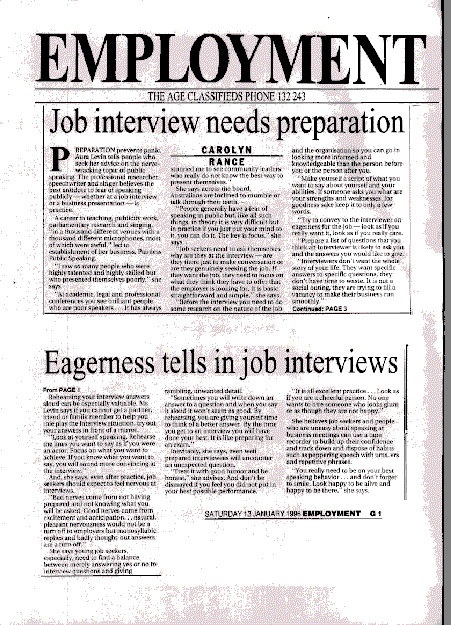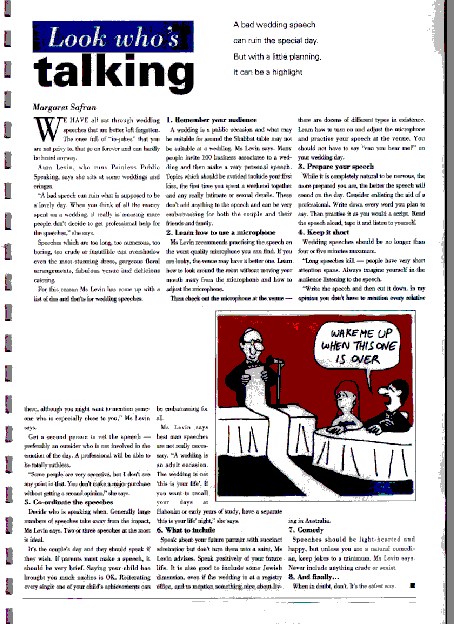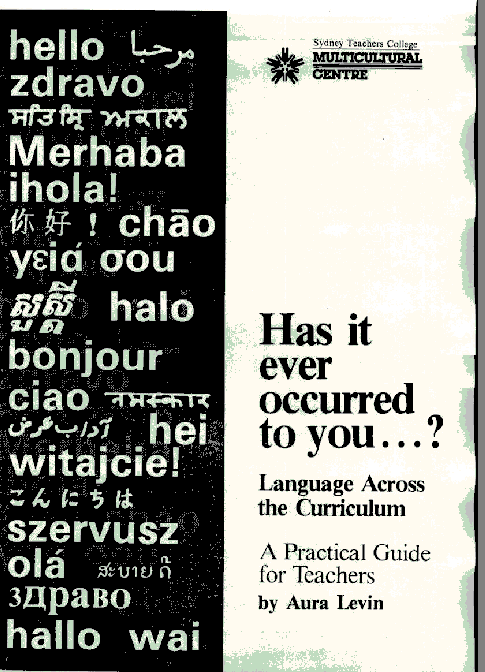|



Read Aura's articles published in Show Cause
Magazine.
December 1999 and May 2000
Show Cause is the magazine of the alumni of the University of NSW.
PAINLESS PUBLIC SPEAKING –
Part One
by Aura Levin Lipski
"I am toying with titles for the book I am
writing.
The titles fluctuate with the type of client who
comes through my doors.
At the moment, the recurring theme is: "You
don’t have to be a brain surgeon to be a good public speaker".
This is my overwhelming message. Throw away your
fear! There are simple tips and techniques to make anyone a competent
speaker at any occasion.
Why am I so sure of this? Because I was not born
a natural public speaker, and only became one later in life –
long after I’d finished my formal education.
I had a wonderful time doing both my B.A. and my
Masters in History at the University of New South Wales. I was exposed
to some of the best teachers that the university had to offer –
and to some of the worst. In history and politics in particular,
I was fortunate enough to
have lectures and tutorials with people who were, or went on to
become, luminaries in their fields – Owen Harries, Donald
Horne, Steven Morris.
I always enjoyed my tutorials with the late Professor
Douglas Macallum, whose dry wit and puns about Marx eased us into
an understanding of the political process. In history both Ian Tyrrell
and Ian Bickerton had a way of using humour to make the group feel
comfortable and enjoy the learning process.
Why am I reminiscing over old times when this is
supposed to be a practical article on public speaking?
It’s because the way to become an effective
speaker is to think carefully about your audience, whether it is
a large lecture theatre or a handful of listeners. The seminal question
to ask is: "Why are you there?" And following on from
that, "Why are these people listening to me?"
Those academics in my years at the university who
took the trouble to understand their audience – captured their
audience, whether in lectures or tutorials. Speakers can best convey
their ideas and information when they really understand their audience
- in particular, what the audience perceives to be the speaker’s
strengths. You’ve heard of ‘value for money"? Well,
every audience has an inbuilt
detector of "value for speaker". The best speakers understand
this, and emphasize their own particular strengths, usually one
or a mixture of humour, passion and knowledge.
The most popular public speaker in Australia today
is the ex-cricketer Max Walker. He is also a top-selling author
and his speaking promotes his writing. Max Walker’s great
strength is his understanding of his audience. He knows that they
want light-hearted, easily absorbed stories and that they come to
hear him, or read his books, for the sole
purpose of being entertained. His secret is never trying be someone
that he is not. He tells his stories with humour and verve and this
works perfectly with his audiences.
Passion is another reason audiences come to hear
a speaker. The great dissidents and political activitists are passionate
about their causes, and their aim is to pass on the power of their
passion to their audience. If you go to hear Fidel Ramos Jorta ,
the Nobel Prize winner and Timorese activist, it is because of his
passion for his cause and his people. Martin Luther King kindled
people’s feelings around the world because of his passion
for equality and the dream of a world free of racial discrimination.
Noel Pearson argues his case brilliantly with facts and knowledge,
but it is his passion which gives such force and power to his message.
As I mentioned previously, I was not born with
a natural gift for public speaking, and although I adore puns and
witty conversation, I have never been able to use them for myself
in a public situation of more than two sentences. So how did I become
an authority on public speaking?
Passion. I had a life-changing experience which
opened up a world of such momentous historical impact that it turned
me into an instant public speaker, and taught me the lessons of
passionate persuasion.
This all sounds a bit dramatic, but here’s
the story. In 1987, just as the glimmers of glasnost began but while
the Soviet system was still very much in control, I was invited
on a trip to Moscow with my journalist husband, Sam Lipski. He was
to interview a number of dissidents and refuseniks – Jews
who had applied to emigrate from the Soviet Union
to Israel and whose exit had been denied. Many of these refuseniks
had waited up to 18 years for the permission to leave the country
of their birth. Literally from the moment they had applied to leave,
they were black-banned in their society. Their rights and privileges
were removed; most lost their jobs. Scientists and engineers were
consigned to working as cleaners or lift-operators. They relied
on food parcels and gifts from abroad to keep their families afloat.
I was really a bystander to all this, but the courage
and will of the people we met left an indelible impact on me. There
were many highlights of that trip: meeting young people who had
studied Hebrew secretly (it was a banned language and you could
be jailed if you were discovered teaching or studying it). Meeting
families who by their strength of will put up with derision and
humiliation from the society
around them: being wire-tapped, followed and harassed.
These encounters left me in awe of the spirit of
these ordinary people who were deprived of the everyday, ordinary
rights we all take for granted as Australians: the right to travel
in and out of our own country without restriction; the right to
practise any or no religious observance of any kind, as we wish.
And the right to go about our daily lives in freedom and security.
But one of the great highlights of that trip was
sitting in the kitchen of the great dissident scientist Andrei Sakharov
and his wife, Elena Bonner, while my husband interviewed them. Here
was a couple who had suffered and struggled, who had been exiled
to a remote corner of the Soviet Union, merely for pursuing the
human rights of their
countrymen.
When I returned to Australia from this eventful
trip, I was asked by many community groups to speak about the refuseniks
and their plight. In 1987 no one could dream that the Soviet Union
would lose its powerful grip over its citizens, and the world-wide
campaign to try to free the people who wanted simply to leave was
at its height.
So I began speaking endlessly to groups about the
plight of the refuseniks; the current situation in the Soviet Union
and the loss of their individual human rights. But I didn’t
do this in the form of giving lectures or speeches. I told stories.
There is a massive difference between a speech
and a story. Telling a story means you want to your listeners to
share a human experience. I wasn’t an expert on the history
of human rights in the Soviet Union. But I was someone who had been
there; who had spoken to dozens of
people in their living rooms over endless cups of tea telling their
own stories. And it was their stories which captivated me, and empowered
me with the passion to tell them to others in a continent across
the world.
How are humour, passion and stories relevant to
those whose profession it is to impart information, sometimes highly
technical information? We hear the term "knowledge worker"
used widely today and academics are perhaps the epitome of "knowledge
workers". Yet while an academic’s primary job is to impart
knowledge to students and how to pursue knowledge – that is
the answer to the "Why am I here?" question - humour,
a passion for the subject, and the ability to tell stories can all
help.
True, in the academic world humour and passion
alone are not enough. A lecturer has to have a body of real knowledge
to communicate. The secret for the lecturer, as for any knowledge
worker, is to understand what personality type you are, and what
methods will work best for you in conveying that knowledge so that
it is meaningful and well-absorbed.
But how does a brain-surgeon become an effective
speaker? Clearly, the brain-surgeon has an enormous store of technical
information. Yet in talking to a non-specialist audience, or even
to an audience of student would-be surgeons, I would advise the
speaker to convey their
passion for their work; to emphasise the impact of changing people’s
lives through what they do. This approach should stimulate and motivate
their students to greater standards of learning than giving a standard
lecture on neurological function.
And if you’re not a brain surgeon? Well,
you’ll have to wait for Part Two of this article in the next
issue!"
PAINLESS PUBLIC SPEAKING – Part Two
Passion, knowledge, and humour are the three essential
elements of a good public speaker whether academic, brain surgeon
or political activist. That was the theme of my first article on
“painless public speaking” in the last issue of “Show
Cause”. But, that article concluded, what if you’re
not a brain surgeon?
The answer for any public speaker begins with an
interactive case study where you, the reader, will have to participate.
Take a moment to read the first two lines of one of the most famous
speeches ever given.
" Four score and seven years ago, our fathers
brought upon this continent a new nation: conceived in liberty,
and dedicated to the proposition that all men are created equal."
Yes, those were the opening words of the Gettysburg
Address and yes, the speaker was Abraham Lincoln.
He delivered those immortal lines at the dedication
of the war cemetery at Gettysburg, Pennsylvania, in November 1863.The
battle of Gettysburg had taken place in July of that year. It was
the turning point of the civil war.
This speech is so important to the United States
and to Americans, that American schoolchildren have to memorise
it in primary school. I know, because when I lived in the United
States as a fourth grader, we had to recite it regularly.
The questions I ask you to think about as you read
this article are:
- Did Abraham Lincoln deliver his speech off the top of his
head?
- Did he scribble a few notes on the way to the talk?
- Did he use a few cue cards to guide him along?
None of the above! There are at least five drafts
of this speech in library archives, and historians continue to debate
which version Lincoln actually delivered. Lincoln used to walk through
the woods, reciting his speeches out loud. He spoke to the trees,
going over his speeches, crafting every word. Still not satisfied,
he even altered the final draft on the train to Gettysburg.
Lincoln put so much effort into this one speech,
yet it was only one of many speeches in the lifetime of a presidency.
But this was the speech that changed the course of history.
Not all speeches do that, of course, and only a
few ever aim for such an outcome. But a Gettysburg Address emphasise
the point for all of us: Words have power. They have impact. They
have to be chosen very carefully to leave their mark. To quote Bill
Hayden when he was Australia’s Minister for Foreign Affairs:
“Words are bullets.”
So before you speak, you want to make sure that
every word you intend to say is aimed at the right target and is
part of a total structure of meaning.
This total structure approach affects basic questions
you have to ask when you are writing your scripts for your lectures,
presentations or speeches. How much information do you really need
to give to your audience?
It is as important to distill your remarks equally
for two people as for 200. You need to decide how much information
they can absorb from your voice; and how much they are absorbing
from the other distractions and variables –eg the body language
-- that accompanies them.
My rule of thumb in all public speaking is: less
is more. Information takes a long time to absorb. The sound waves
are very slow, and our internal processing mechanisms are complex.
The information you are giving to your audience needs to be filtered
- slowly. And, critically, it needs to be clear and as “simple”
as the subject allows.
We haven’t finished with the Gettysburg Address
and Abraham Lincoln, but let's assume that you have chosen your
remarks with care. You have worked out what you will say and you're
ready to speak.
Take a breather for a moment because having practised
the first phase of preraption we now come to the second phase of
communicating: your presentation.
Any speech involves two equal components: Content,
and presentation. Your content may be perfect; but if your delivery
is off, it is your tone of voice that will be remembered rather
than what you have actually said.
Picture the same telephone conversation with two
people you know: one – an optimist, the other a pessimist.
Clearly, you will be affected by the differing tone of their voices.
The cheerful friend can lift your mood immediately; the unenthusiastic
friend can make you sorry that you rang.
It is critical to understand the tone your voice
convey to others. There is only one way to find out: Listen to yourself.
Audio- tape yourself reading a text or a lecture out loud, and listen
carefully. Now you will know where you work has to begin. Some simple
voice lessons can make the world of difference to your audience’s
attention level.
Speaking to people involves a great deal of thought
and preparation: Not only the content - what you are going to say,
but the presentation - how you are going to say it. It's like that
old song Love and Marriage: like a horse and carriage, you can't
have one without the other!
Now back to President Lincoln. I often tell my
clients that the nature of public speaking has changed over the
past 10-20 years, largely because of the changing nature of television
and its effect on audience attention span.
Most of the information on television about the
world around us comes from 30-second news grabs, or from commercials
that can tell us someone's whole life story in 45 seconds. So audiences
are increasingly restless at having to listen to a speaker for more
than 10 minutes, let alone the 50 minutes still allotted for most
formal academic lectures.
But Abraham Lincoln didn't have television to influence
him and, nevertheless, even back in 1863, the Gettysburg Address
was only 270 words long. The entire speech takes less than three
minutes to deliver. Less really is more.
Just to underline the point that not all speeches
are equal, Abraham Lincoln was not the only speaker on that day
in Gettysburg. The venerable Edward Everett, the nation's foremost
speechmaker of the time, was actually the one who was invited to
give an oration at the dedication ceremony - long before Lincoln
was invited.
It's a very interesting sequence of events: Everett
was invited on September 23 for the event planned for October 23.
He accepted the invitation, but, he needed more time to prepare
his speech. He persuaded his hosts to postpone the ceremony to November
19.Lincoln was only invited three weeks before the dedication.
Have any of you ever heard of Edward Everett? He
certainly did not leave his mark on history - and he spoke for two
hours! Abraham Lincoln gave a speech of 270 words - less than three
minutes.
Lincoln's general purpose in his speech was to
move the American people and influence the outcome of the war. But
his specific purpose was to preserve the Union of the United States,
something which he cared about passionately and profoundly. And
that's why he chose his words, and planned his delivery, so carefully.
There can be no better model for any speaker. I
hope his spirit will guide you when you are writing your next speech.
|

